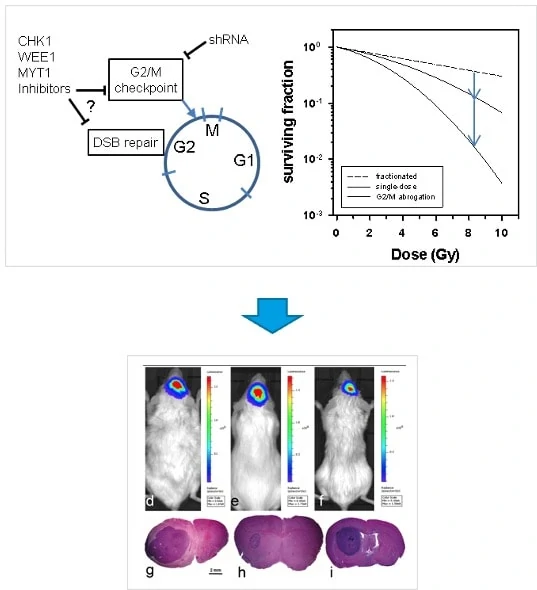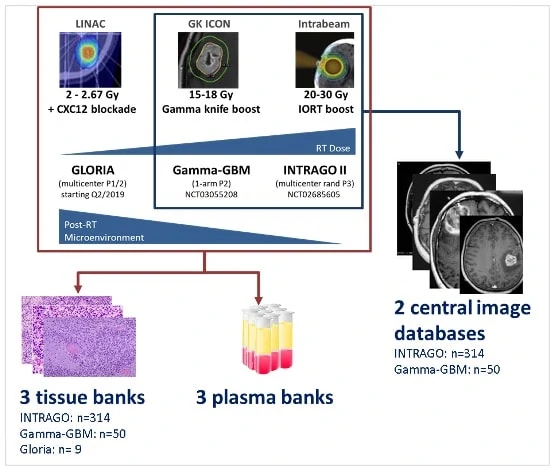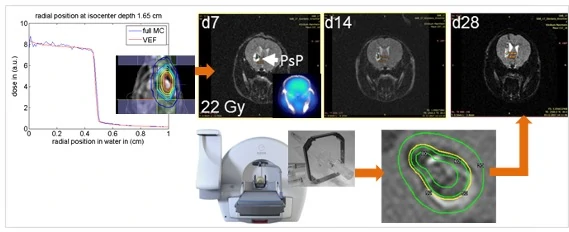Research > Focus B > Work Packages B05
Summary
Intrinsic radioresistance of glioblastoma may require the application of high(er) doses of focused radiotherapy but most of the benefit is counterbalanced by a complex and poorly understood tumor- and microenvironment response that will be comprehensively analyzed within this translational research project. The aim of this project is to understand molecular determinants and improve efficacy of high-dose radiotherapy in glioblastoma and identify combination strategies. The visual abstract below shows the aims and planned tasks of the work package.
Task 1
Evaluating the impact of high doses on intrinsic radioresistance
Steps / Workflow
- Increase proportion of severe (non-tolerated) damage owing to misrepair after irradiation with high single dose (8-20 Gy) and test effect of small-molecule inhibitors on checkpoint abrogation and DSB repair.
- Discover/inactivate target genes that will increase misrepair by abrogation of the G2/M checkpoint without inhibiting DSB repair.
- Test biomarkers that will predict the response of individual glioblastomas to inhibiting the new target gene(s) in combination with high single dose radiotherapy.
Task 2
Characterization of immediate and long-term micro-environmental responses after high-dose RT
Steps / Workflow
- Combining high-dose RT and inhibitors of the radiation-associated and hypoxia-induced factor CXCL12
- Exploring the role of the microenvironmental factor CCL2 after high-dose RT
- Combine various RT fractionation schemes (ranging from frequent low doses to ultra-high single doses) with immune checkpoint inhibitors
Task 3
Validation of predictive markers in clinical trials using focused high-dose radiotherapy
Steps / Workflow
- Screen plasma for markers (identified in task 2) indicative for response/toxicity in pre-clinical models in phase I-III trials on high-dose RT
- Explore clinical relevance of identified factors/targets by radiomic analyses of central image datasets of clinical phase II and III trials
Task 4
Collaborative UNITE-IGRT and small-animal imaging platform.
Steps / Workflow
- Improve/sophisticate treatment planning (Monte Carlo) for small-animal precision IGRT
- Use advanced small-animal imaging to more precisely radiogenic alterations after high single doses
- Commissioning of the Leksell Gamma Knife for radiosurgery in small animals

VELDWIJK, MARLON R., PROF. DR.
Mannheim Medical Faculty, University of Heidelberg, Dept. of Radiation Oncology, Translational Radiation Oncology, Theodor-Kutzer-Ufer 1-3, D-68167 Mannheim, Germany
Address
Im Neuenheimer Feld 400
69120 Heidelberg
Themen
Research
- Focus A
- A01: Targeting tumor cell network communication to overcome primary and adaptive resistance in glioblastoma
- A02: Development of a specific combination therapy for histone H3-mutant pediatric glioblastoma
- A03: Deciphering resistance against targeted treatments
- A04: Elucidating tumor-associated microglia interactions in astrocytomas CNS WHO-grade 4
- A05: Predictive biomarkers for MGMT-promoter-methylated glioblastoma (2019 – 2023)
- A06: Resistance mechanisms of glioblastoma against alkylating agents and radiotherapy
- A07: Mapping and targeting neuron-tumor networks to tackle therapy resistance in glioblastoma
- A08: Personalized glioblastoma treatment guided by patient-derived tumor organoids
Research
- Focus B
- B01: Mechanisms of response and resistance to glioma-specific t cells
- B02: DNA mis-match repair regulates immune checkpoint blockade therapy in glioblastoma (2019 – 2023)
- B03: Targeting immunosuppressive programs in isocitrate dehydrogenase mutant gliomas
- B04: Impact of myeloid cells on the adaptive immune response in newly diagnosed and recurrent glioblastomas
- B05: Dissecting the response of glioblastoma and its tumor microenvironment to focused high-dose radiotherapy (2019 – 2023)
- B06: Visualization and characterization of immune responses in H3K27M mutant gliomas
Research
- Focus C
- C01: Comprehensive preclinical pharmacology testing of drugs used for glioblastoma treatment
- C02: Radiomics, radiogenomics and deep-learning in neurooncology
- C03: Imaging immune signatures of glioma response and resistance towards immunotherapy (2019 – 2023)
- C04: Metabolic signaling in glioblastoma: a spatial multi-omics approach
- C05: Overcoming glioma radio-resistance with particle therapy
- C06: Functional characterization of EGFR structural variants associated with long-term survival in glioblastoma, IDH-WT





